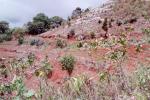Recovery and Agriculture in Haiti
 Regardless of the outcome of the upcoming elections, one hopes that promoting agriculture and rehabilitating the environment will be high priorities for the next administration. Countries that import the majority of their food staples, as Haiti does, are vulnerable to price shocks when international food prices increase. Rural development depends in large part upon making agriculture viable again. This will require tackling environmental degradation, improving disaster preparedness, upgrading infrastructure and resolving long simmering land tenure issues. These challenges are difficult but not insurmountable.
Regardless of the outcome of the upcoming elections, one hopes that promoting agriculture and rehabilitating the environment will be high priorities for the next administration. Countries that import the majority of their food staples, as Haiti does, are vulnerable to price shocks when international food prices increase. Rural development depends in large part upon making agriculture viable again. This will require tackling environmental degradation, improving disaster preparedness, upgrading infrastructure and resolving long simmering land tenure issues. These challenges are difficult but not insurmountable.


